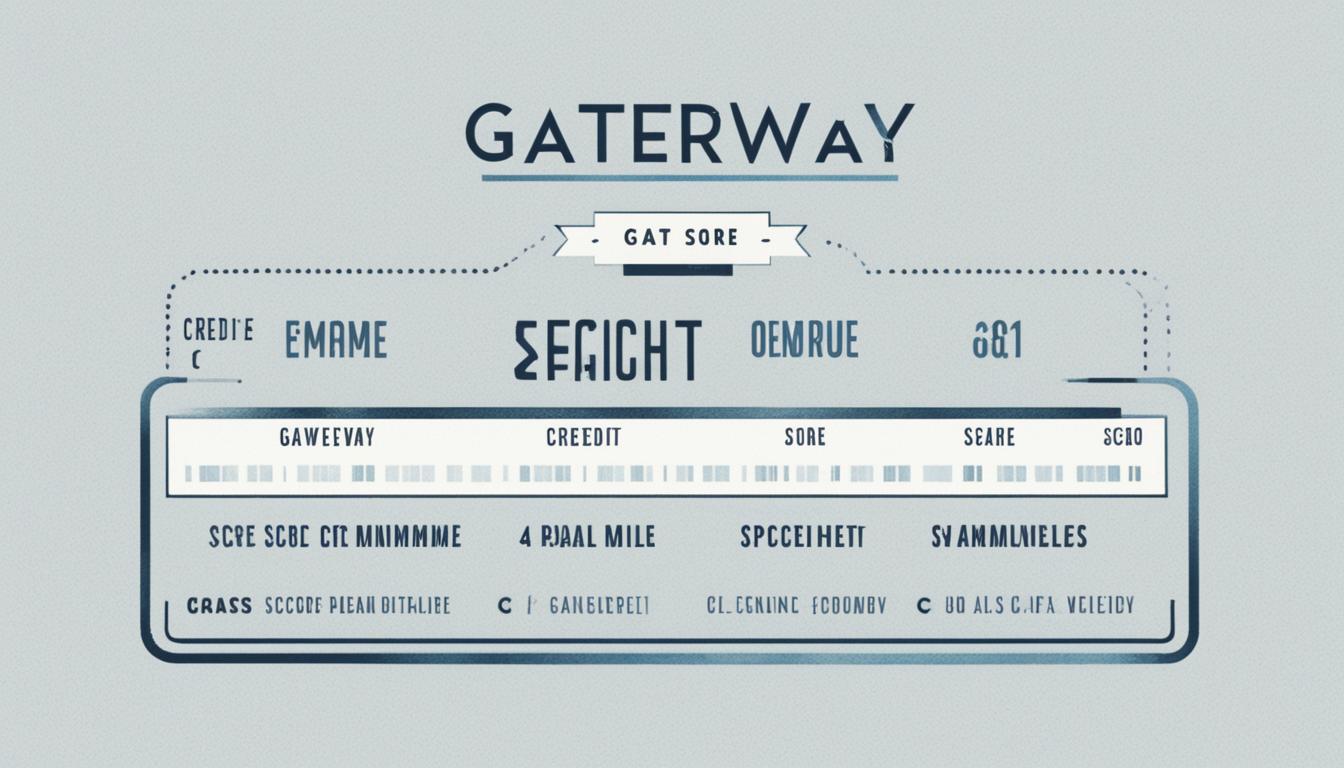Welcome to our guide on credit accessibility and how Earnest’s minimum credit score requirement can shape your financial options. Whether you’re looking for a personal loan or a student loan, understanding how your credit score plays a role in loan qualification and financial eligibility is essential. In this article, we’ll explore the importance of credit scores, finding personal loans with low interest rates, deciding if a personal loan is right for you, tips for getting a low-interest personal loan, and a review of Earnest student loans.
Key Takeaways:
- Earnest’s minimum credit score requirement can affect your ability to access credit options.
- Researching interest rates and comparing lenders is crucial to finding personal loans with low interest rates.
- Consider if a personal loan is the right financial option for your needs before applying.
- Improving your credit score can increase your chances of qualifying for a low-interest personal loan.
- Earnest offers competitive student loan options with various repayment terms.
Finding Personal Loans with Low Interest Rates
When searching for personal loans with low interest rates, it’s crucial to compare lenders and their interest rate offers. Reputable financial websites like NerdWallet can provide a comprehensive list of personal lenders and their current rates, making it easier for you to evaluate your options.
To find personal loans with the lowest interest rates:
-
- Check both fixed and variable interest rates:
Understanding the difference between fixed and variable rates is essential in finding the best loan option for you. While fixed rates offer stability and predictable monthly payments, variable rates can fluctuate based on market conditions. Consider your financial goals and risk tolerance when choosing between the two.
-
- Consider your credit score:
Excellent credit holders with a score above 720 are more likely to qualify for personal loans with the lowest interest rates. Lenders generally offer better terms to borrowers with a strong credit history. However, even if you have a lower credit score, there are still lenders willing to work with you, albeit at higher interest rates.
-
- Look for loan approval:
While interest rates are a significant factor, loan approval is equally important. Some lenders may have stricter criteria for loan qualification, which could make it challenging for those with lower credit scores to get approved. Research lenders who are known for working with borrowers in a similar credit range as yours.
-
- Read the fine print:
Before committing to a personal loan, carefully review the terms and conditions. Pay attention to any hidden fees or clauses that could affect the overall cost of the loan. Understanding the loan’s repayment terms, such as the length of the loan and any potential penalties for early repayment, is crucial to making an informed decision.
Remember, finding a personal loan with a low interest rate requires thorough research and consideration. With the right lender and favorable terms, you can secure a loan that meets your financial needs.
Deciding if a Personal Loan is Right for You
Personal loans can be a good financial option for individuals looking to pay off high-interest credit card debt or cover one-time expenses. However, it is important to consider if you truly need the loan and if there are other options available. Personal loans often have higher interest rates compared to secured loans, such as home equity loans. It is also crucial to assess the purpose of the loan and explore other loan options before proceeding.
If you’re burdened with credit card debt, a personal loan can help consolidate your balances into a single monthly payment. By doing so, you may be able to pay off your debt faster and at a lower interest rate. This can save you money in the long run and improve your financial situation.
Furthermore, if you have a one-time expense that you aren’t able to cover with your current savings, a personal loan can provide the necessary funds. Whether it’s a medical emergency, home repair, or a dream vacation, a personal loan can offer the financial assistance you need.
However, before committing to a personal loan, be sure to explore other loan options and evaluate their suitability for your situation. For instance, if you own a property, a home equity loan might offer lower interest rates due to the collateral involved. Additionally, if the expense is manageable and you have the discipline to save, consider delaying the expense and saving up the required funds instead.
Remember that personal loans are unsecured, meaning they don’t require collateral. As a result, lenders may charge higher interest rates to offset their risk. It is essential to carefully assess your financial situation and determine if the interest and repayment terms align with your long-term goals.
By carefully weighing the pros and cons, exploring alternative loan options, and considering your financial goals, you can make an informed decision about whether a personal loan is the right choice for you.

Tips for Getting a Personal Loan with a Low Interest Rate
If you’re looking for a personal loan with a low-interest rate, there are several strategies you can follow to improve your chances of securing one. By focusing on your credit score, loan amount, repayment term, and debt-to-income ratio, you can enhance your creditworthiness and potentially qualify for a more favorable loan offer.
1. Improve Your Credit Score
Your credit score is a crucial factor that lenders consider when determining your interest rate. To boost your creditworthiness, make sure to make timely monthly payments on all your credit accounts. Paying down existing debt and keeping your credit utilization low can also have a positive impact on your credit score.
2. Decrease Your Loan Amount
Another way to increase your chances of securing a low-interest personal loan is by reducing the loan amount you need to borrow. Lenders are more likely to offer favorable rates to borrowers with lower loan amounts. Consider saving up for a larger down payment or exploring other sources of funding to minimize the loan amount.
3. Choose a Shorter Repayment Term
Opting for a shorter repayment term can also help you secure a lower interest rate. Lenders often offer lower rates for loans with shorter repayment terms because they pose less risk. Before deciding on a repayment term, evaluate your budget to ensure that you can comfortably handle the higher monthly payments that come with a shorter term.
4. Improve Your Debt-to-Income Ratio
Your debt-to-income ratio, which is the percentage of your monthly income that goes toward debt payments, is an essential consideration for lenders. Lowering your debt-to-income ratio by paying off existing debts or increasing your income can improve your creditworthiness and increase the likelihood of qualifying for a low-interest personal loan.
5. Check Your Credit History for Errors
It’s important to review your credit history regularly to identify any errors or discrepancies that may be negatively impacting your credit score. If you find any inaccuracies, dispute them with the credit reporting agencies to have them corrected. A clean and accurate credit history can help you secure a better loan offer.
6. Explore Options for Increasing Your Income
If you’re struggling to meet the qualifications for a low-interest personal loan, consider exploring opportunities to increase your income. Taking on a part-time job, starting a side business, or freelancing can help boost your earnings and strengthen your financial position, potentially making you a more attractive borrower.
By following these tips, you can improve your chances of getting a personal loan with a low-interest rate. Remember to research different lenders, compare interest rate offers, and consider other factors such as loan terms and customer reviews before making your final decision.

Earnest Student Loans Review
Earnest offers a range of student loan options designed to support students in their pursuit of higher education. With competitive rates and flexible repayment terms, Earnest student loans are tailored to meet the needs of borrowers.
When it comes to repayment, Earnest provides multiple options to choose from, ensuring that borrowers can select the one that fits their financial situation. These options include deferred repayment, interest-only repayment, and full repayment.
Eligibility requirements for Earnest student loans are straightforward. Borrowers must be attending an eligible four-year institution, a US citizen or permanent resident, and pass a credit check. These requirements ensure that students have access to the financial support they need to pursue their educational goals.
The loan process with Earnest is simple and convenient. Students can apply online, saving time and effort. Additionally, the loan funds are disbursed directly to the college, streamlining the process and ensuring that students can focus on their studies without worrying about financial matters.

Earnest’s commitment to providing student loan options with favorable terms and a straightforward application process makes them a reliable choice for students seeking financial assistance for their education.
Conclusion
In conclusion, understanding Earnest Student Loans’ minimum credit score requirements is crucial for shaping your financial options when considering personal and student loans. By conducting thorough research on interest rates, carefully considering your loan purposes, and taking steps to improve your credit score, you can significantly increase your chances of qualifying for lower interest rates and more favorable loan terms.
Whether you decide to pursue a personal loan or an Earnest student loan, it is important to explore all available options to find the best solution for your specific financial needs. Keep in mind that by taking proactive steps to improve your creditworthiness, you can open doors to better loan rates and broader financial opportunities.
Remember, a good credit score is a valuable asset when it comes to securing favorable loan rates and accessing a range of financial options. By maintaining a strong credit score and being diligent in your financial management, you can position yourself for success and attain the financial freedom you desire.


No comments! Be the first commenter?